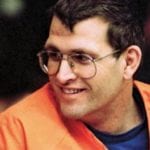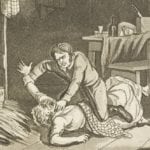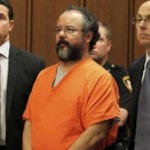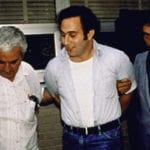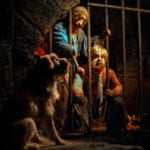 Mysteries
Mysteries  Mysteries
Mysteries  History
History 10 Surprising Stories About the Texas Rangers
 Humans
Humans 10 Philosophers Who Were Driven Mad by Their Own Theories
 Miscellaneous
Miscellaneous 10 Video-Game-Worthy Weapons and Armors from History
 Weird Stuff
Weird Stuff 10 Psychics Who Accurately Predicted Wartime Events
 The Arts
The Arts 10 Pieces of Art Inspired by a Broken Heart
 Health
Health 10 Science Fiction-Sounding New Medical Treatments
 History
History 10 Surprising Facts About the Father of Submarine Warfare
 Space
Space Ten Astonishing New Insights into Alien Worlds
 Weird Stuff
Weird Stuff 10 Bizarre Summer Solstice Rituals Still Practiced Today
 Mysteries
Mysteries Top 10 Haunting Facts About the Ghost Ship MV Alta
 History
History 10 Surprising Stories About the Texas Rangers
 Humans
Humans 10 Philosophers Who Were Driven Mad by Their Own Theories
Who's Behind Listverse?

Jamie Frater
Head Editor
Jamie founded Listverse due to an insatiable desire to share fascinating, obscure, and bizarre facts. He has been a guest speaker on numerous national radio and television stations and is a five time published author.
More About Us Miscellaneous
Miscellaneous 10 Video-Game-Worthy Weapons and Armors from History
 Weird Stuff
Weird Stuff 10 Psychics Who Accurately Predicted Wartime Events
 The Arts
The Arts 10 Pieces of Art Inspired by a Broken Heart
 Health
Health 10 Science Fiction-Sounding New Medical Treatments
 History
History 10 Surprising Facts About the Father of Submarine Warfare
 Space
Space Ten Astonishing New Insights into Alien Worlds
 Weird Stuff
Weird Stuff 10 Bizarre Summer Solstice Rituals Still Practiced Today
10 Dark And Twisted Rock And Roll Tales
Rock legends are built on the extremes to which musicians go to shock and captivate fans. Everyone has heard the story of Ozzy Osborne biting the head off of a bat during a concert. Iggy Pop rose to fame while cutting himself onstage. Elvis was shocking because of the way he danced on television. None of those stories hold a candle, however, to these horrifying stunts that shocked audiences around the world.
10The Mentors
Originally formed in Seattle in 1976, The Mentors moved to Los Angeles in 1979 and quickly gained notoriety in the hard rock scene. The band members—guitarist Sickie Wifebeater, bassist Dr. Heathen Scumbag, and drummer/singer El Duce—all wore executioner masks and played what they called “rape rock.” Their unabashedly disgusting songs included titles like “Golden Showers,” “On the Rag,” and “Service Me or Be Smacked.”
Due to the extreme nature of their act, The Mentors had a limited following but gained widespread national media attention. They appeared on The Jerry Springer Show and were named in the bill championed by Tipper Gore in 1985 to put warning labels on album covers.
In the 1998 documentary Kurt & Courtney, El Duce—whose real name was Eldon Hoke—claimed that Courtney Love offered him $10,000 to kill Kurt Cobain. Days after the interview, Hoke performed his last show on April 18, 1997. Hoke partied hard after the show, and during the night, he stumbled drunkenly onto a set of railroad tracks and was struck by a train. It is unclear if it was an accident or suicide.
9Gram Parsons

Gram Parsons was an American musician who wasn’t very well known, but his hybrid of rock, country, and folk that he called “cosmic American music” was incredibly influential. He played with bands like The International Submarine Band, The Byrds, and The Flying Burrito Brothers before he released a solo album called GP.
Parsons was preparing for a tour scheduled to begin in October 1973 when he took a detour to visit Joshua Tree National Park before hitting the road. The park had become one of Parsons’s favorite places, and he even told friends that when he died, he wanted to be cremated and have his ashes scattered at Cap Rock. That time would come a lot sooner than anyone expected, when Parsons was found unresponsive in his room after consuming a lethal combination of morphine and alcohol and pronounced dead at the hospital on September 19, 1973.
Despite his wishes, his stepfather wanted Parsons’s body to be sent back to New Orleans, where he had planned a private ceremony to which none of Parsons’s music friends were invited. Determined to keep his promise to his friend, Phil Kaufman stole Parsons’s body from the airport as it was being shipped and took it on a road trip to Cap Rock. There, he and a friend poured 19 liters (5 gal) of gasoline over the body and threw a match into the coffin. This caused a huge fireball which didn’t incinerate the body but did draw the attention of the police. Kaufman and his accomplice were arrested two days later, but since there was no law against stealing a dead body, they were simply fined $750 for stealing the casket. The remains of Parsons’s body were shipped back and buried in Louisiana.
8Lamb Of God
Lamb of God was formed in 1990 under the even more offensive name Burn the Priest. Over the span of their career, they have released seven albums and toured with some of the biggest names in metal. They took the stage at Ozzfest twice and opened for both Metallica and Slayer.
To say that a mosh pit is a dangerous place is simply stating the obvious—it is usually comprised of angry young men slamming into each other. The very idea of it is a violent act, but Lamb of God stepped up the level of danger involved with the “heavy metal dance.” They were instrumental in popularizing what’s known as “The Wall of Death,” inciting the pit to split into two crowds and then run at each other during their song “Black Label.”
On May 24, 2010, Lamb of God was playing in Prague, Czech Republic when lead singer Randy Blythe invited the crowd to “come on up!” That was meant as an encouragement to cheer, but 19-year-old Daniel Nosek had a different idea. He tried to climb onstage, but Blythe pushed him off, sending Nosek hurtling to the ground. His injuries put him in a coma, and he died a few weeks later. Blythe claims he didn’t know anything about the death until the band returned to do a show in June 2012, when Blythe was arrested at the airport and charged with manslaughter. He was released on bail and returned to the United States to await his March 2013 trial. Though he faced a possible 10-year sentence, he was acquitted of all charges because security should not have allowed Nosek onstage in the first place. Blythe has since taken a break from Lamb of God.
7Tim Lambesis
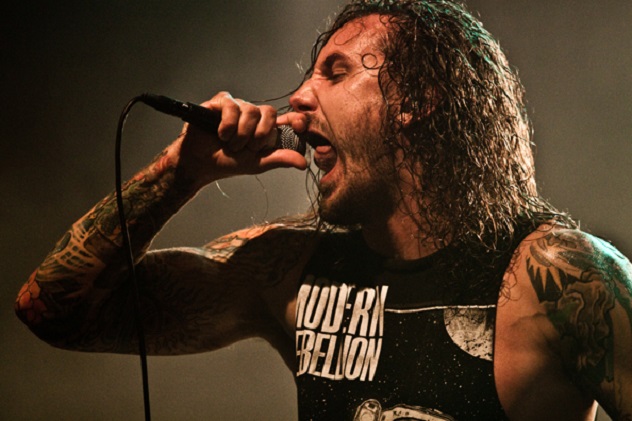
As I Lay Dying was a Christian metalcore band that was formed in San Diego, California in 2001. They found success with their fourth album, An Ocean Between Us, which reached No. 8 on the Billboard 200 and No. 1 on the Modern Rock Charts.
In 2012, singer Tim Lambesis began having problems with his wife, Meggan. The couple had been married for eight years, and they had adopted three children from Ethiopia together. As with many divorces, Lambesis and his wife were having arguments over money and custody of their children. Lambesis was so frustrated with the situation that he asked another member of his gym if he knew anyone who would kill his wife for money. The man contacted the police and they set up a sting. Lambesis met with an undercover police officer, whom he paid $1,000 as a down payment for the hit on his wife.
He was arrested and originally pleaded not guilty, blaming his actions on brain damage caused by steroids. He later changed his plea to guilty, and as of 2014, he is awaiting sentencing. He faces up to nine years in prison and $10,000 in fines.
6Ian Watkins
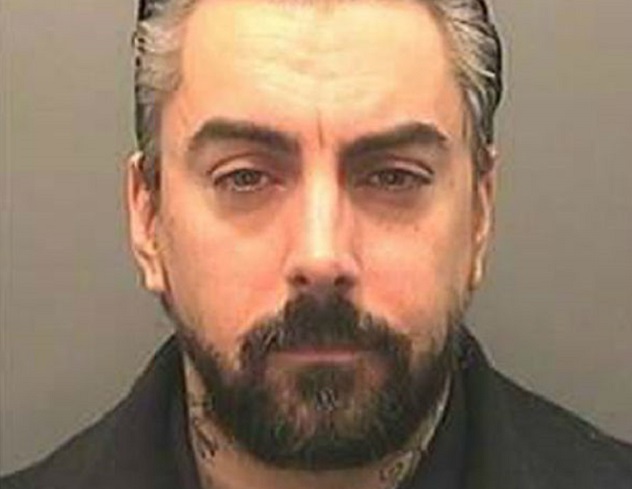
Lostprophets was a modern rock band from Wales that was formed in 1997. They gained notable attention with their single “Last Train Home” and have sold a total of 3.5 million albums. While the band may have been dismissed as one-hit wonders, lead singer Ian Watkins resurfaced in the news for all the wrong reasons.
Using his status as a musician, Watkins convinced some of his fans to do horrible things to children. His atrocities included encouraging mothers to sexually abuse their children over webcam chats with him. Through his network of fans, he not only received child pornography, but he also appeared in pictures and videos attempting to rape other children. He wanted the parents to prepare the children to have sex with him. He even admitted to trying to rape a baby under the age of one. Besides the charges of sexual abuse, Watkins also fed the children he assaulted drugs like crystal meth.
While the extent of Watkins’s crimes has yet to be established, he has confessed to attempted rape and sexual abuse of a child under 13, along with possessing child pornography. The most appalling and downright baffling aspect of the case is Watkins’s initially carefree attitude toward the charges, illustrated by his intention to release a statement that “It was megalolz, I don’t know what everyone is getting so freaked out about” and try to charm the jury into dismissing the charges. Watkins changed his mind when it was revealed that the jury was going to be shown pictures and videos that involved Watkins. He changed his plea to guilty and was given a 29-year sentence. Two female accomplices were also charged with sexual offenses against children.
5Jon Nodtveidt
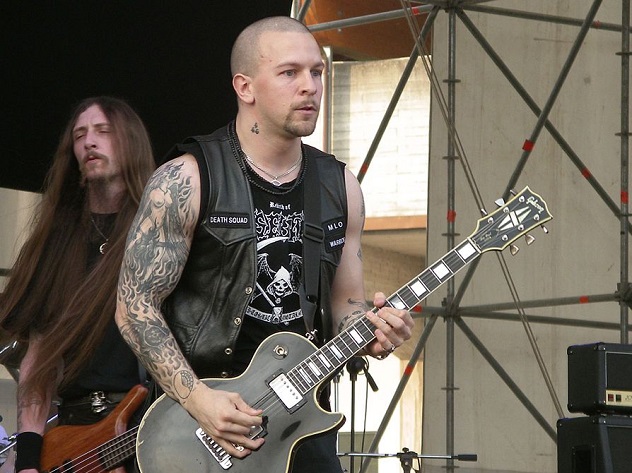
Jon Nodtveidt was the lead singer of the Swedish black metal band Dissection as well as a self-proclaimed satanist. Nodtveidt even joined a satanic organization called the Misanthropic Luciferian Order (MLO). Dissection had released two albums and were finally starting to get some recognition in the metal world when things took a remarkably dark turn.
Nodtveidt and another member of the MLO named Vlad were out drinking in the early morning hours of July 22, 1997 when they came across Josef ben Meddour, a 36-year-old Algerian national who had been living in Sweden for a few years. Meddour asked the pair if they were satanists, due to the way they were dressed. Meddour wanted to know more about satanism, so they invited him to Nodtveidt’s apartment to discuss it.
Nodtveidt and Vlad quickly realized that Meddour was gay, and when they arrived at Nodtveidt’s apartment, Meddour changed his mind about going inside. Nodtveidt briefly disappeared into the house, retrieving a Taser and a gun, before continuing their walk. Shortly thereafter, Vlad attempted to use the Taser on Meddour, who fled in terror. Depending on who is telling the story, either Vlad or Nodtveidt then shot Meddour in the back before shooting him in the head. Both blamed each other for the murder.
The crime went unsolved for several months before Vlad’s girlfriend went to the police, after which the pair was arrested and confessed to the crime. After finishing his sentence in 2004, Nodtveidt joined back up with Dissection. They released a new album in May 2006, but a few months later, Nodtveidt was found dead in his apartment. He had shot himself in the head surrounded by a ring of candles.
4G.G. Allin
In a genre that is built on anti-authority and anti-societal attitudes, one G.G. Allin show was more outrageous than most punk bands’ entire careers. G.G. Allin started life as Jesus Christ Allin in 1956. His nickname was a joke about the way his older brother tried to pronounce “Jesus.” His father was a fanatically religious man who housed his family of four in a log cabin with no running water or electricity. He apparently dug graves for the family and frequently threatened to kill them all and commit suicide. As his father’s mental health worsened, Allin’s mother fled her husband and changed Allin’s name to Kevin Michael, but the nickname G.G. stuck around for his entire life.
Allin released his first album in 1980, but his music isn’t really what he is known for. His stage show is what really set Allin apart from his contemporaries. Onstage, Allin generally only wore a jock strap and sometimes a leather collar. He often hit himself with the microphone, cut himself, and even knocked out his own teeth. He would often take laxatives and then defecate on the stage, sometimes throwing feces at the audience or rubbing it on himself. He attacked audience members, and sometimes they fought back. He masturbated onstage, and female fans performed oral sex on him while he sang. G.G. rarely finished a show before it was shut down, and he was often covered in blood, feces, and urine by the time he had played only a few songs. In the opening sequence of the documentary about him directed by Todd Philips (who would go on to direct Old School and the Hangover triology), he is seen shoving a banana in his rectum and then flicking banana goo at the audience.
Allin was as violent offstage as he was during his shows. He was arrested for assaulting a young girl in early 1990 and came to the attention of the Secret Service when it was discovered that he had been writing letters to John Hinckley Jr. During their investigation, the Secret Service discovered that there was a warrant out for Allin’s arrest for cutting up his former girlfriend. Allin claimed that she wanted him to carve something into her flesh in lieu of a tattoo. He spent three years in prison and promised to commit suicide onstage on Halloween 1990.
On June 27, 1993, Allin had spent most of the day doing cocaine at a friend’s apartment before a concert in New York City. When it was time for him to go onstage, he left the apartment naked and walked across the street to the venue, a bar called the Gas Station. He walked onstage and immediately started beating the audience, even knocking out a cameraman with his own camera. During the second song, he defecated on the stage, rubbing the feces on himself and a female audience member. When fans started to riot, Allin threw himself into a set of French doors, cutting himself up. When the police arrived, Allin borrowed his 17-year-old girlfriend’s miniskirt and went back to his friend’s apartment, covered in blood and feces, as the audience continued to riot. Allin did some heroin and then passed out on the floor, where he died sometime during the night.
At his funeral, his brother would not allow the funeral parlor to wash his brother’s body. As a result, it stank from the show, and his body was bloated and purple. He was dressed in his signature jockstrap and black leather jacket. Friends and fans posed for pictures with the body. A bottle of Jim Beam was placed in his casket, and as it was closed, Allin’s brother put headphones on him and played Allin’s The Suicide Sessions.
3Bard Guldvik ‘Faust’ Eithun

Bard Guldvik Eithun, better known as Faust, was a fixture of the Norwegian black metal scene. He ran a fanzine and played drums in a few bands, most notably Emperor. Eithun was known for his obsession with violence, murder, and pushing the limits.
In the summer of 1992, Eithun was visiting family in Lillehammer. On August 21, he went to a bar but decided to leave after having one pint because he didn’t like the atmosphere. On his way home, he passed through a park that was set up for the 1994 Lillehammer Winter Olympics. Magne Andreassen, an openly gay man, approached Eithun, who followed the man into the forest before stabbing him 37 times. To ensure that he was truly dead, Eithun also kicked Andreassen’s head several times.
Eithun walked back to his mother’s house, washed up, and called another member of the Norwegian metal scene, Mayhem’s Oystein Aarseth, to tell him about the murder. The next day, Eithun met up with Aarseth and his sometime bandmate, Varg Vikernes. Together, they set the nearly 90-year-old Holmenkollen Chapel on fire, almost destroying it. This was a beloved pastime of Aarseth and Vikernes, as you’ll read later on.
Eithun wasn’t arrested until a year later for the murder, and that was only because Vikernes bragged about their crimes. Eithun was sentenced to 14 years in 1994 but served only nine, despite statements that he has no remorse for murdering the man. He continues to make music and has performed with bands like Blood Tsunami, Scum, and his original band, Emperor, who have planned a 2014 tour.
2The Yellow Dogs
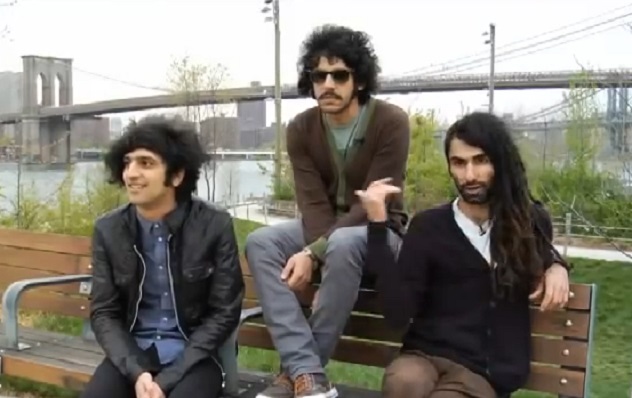
The Yellow Dogs were an indie rock band that formed in Tehran, Iran who played Western instruments and sang in English. Since their music wasn’t approved by the Ministry of Culture and Islamic Guidance, they were forced to play in secret in Tehran, becoming one of the main stars of the underground Tehran music scene.
The migration of Iranian musicians to the United States began when another Iranian rock band, Hypernova, was invited to play South by Southwest in 2007. Once in the United States, their manager persuaded other bands from the Tehran underground to relocate, including The Yellow Dogs in early 2010. They rented a large loft apartment in Brooklyn that became a hangout for Iranian musicians and artists. In December 2011, their manager helped the band The Free Keys move to Brooklyn. One of the reasons he wanted The Free Keys to come to NYC was because the drummer of The Yellow Dogs had quit, and he wanted their drummer to replace him. The Yellow Dogs and The Free Keys agreed that he would share drumming duties in both bands.
One of the problems with getting The Free Keys to the United States was that their bassist hadn’t served his mandatory military service, so he wasn’t eligible for a passport. As a result, they recruited Ali Akbar Rafie, who knew how to play bass and had a passport. Once in America, The Free Keys started fighting, and the drummer left them to play full-time with The Yellow Dogs. The Free Keys also kicked Rafie out of the band because he wasn’t very good and didn’t like to practice. The Free Keys abandoned the loft rented by the Yellow Dogs, and although two members eventually returned, Rafie was not invited back. He took a job as a bike messenger and rented his own small apartment.
Over the next 15 months, Rafie became increasingly paranoid and got involved in an argument with the manager of the bands over money. On November 11, 2013, Rafie walked into the loft that housed The Yellow Dogs with a semi-automatic rifle concealed in a soft-shell guitar case. He opened fire and killed 27-year-old guitarist Sorous Farazmand and his brother, 28-year-old drummer Arash Farazmand. Another musician, Ali Eskandarian, was also killed in the assault. The massacre came to an end when Rafie shot himself. Two members of The Yellow Dogs, singer Koory Mirzeai and bassist Siavash Karampour, survived because they were not in the apartment at the time of the shooting.
1Mayhem
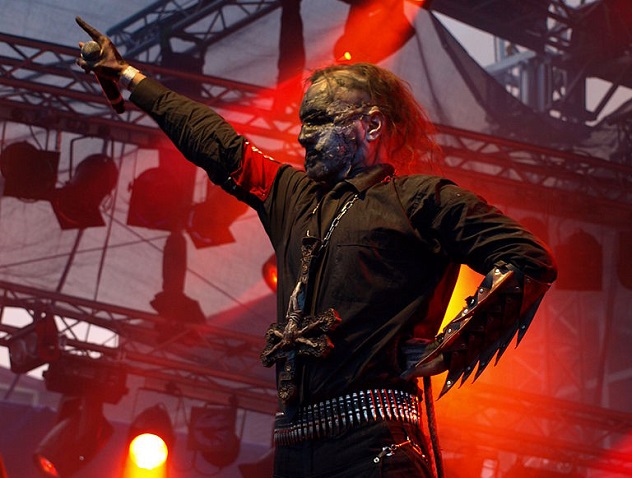
Terrifyingly enough, the previously mentioned tale of Mayhem’s involvement with Faust’s crimes only scratches the surface of the band’s depravity. Emerging from Norway in 1984, Mayhem set out to be a controversial and extremely dark band. Lead singer Per “Dead” Ohlin, who joined the band in 1988, wore black and white makeup to look like a corpse and buried his clothes before wearing them so he looked like he just came out of a grave. Ohlin’s obsession would take a very dark turn on August 8, 1991, when Ohlin cut his wrists and shot himself in the head in a house that was owned by the band. In his suicide note, he apologized for the blood.
The band’s founder and guitarist, Oystein Aarseth, found the 22-year-old’s body. He then went to the store, bought a disposable camera, and took pictures of his former bandmate. One of the pictures was later used in the artwork of a bootleg live album called Dawn of the Black Hearts, which was a recording of the last concert Ohlin performed.
While that is disturbing enough in its own right, that was just the opening act for Mayhem. Between 1992 and 1996, churches across Norway were attacked by serial acts of arson. The earliest fires were set by Aarseth along with Mayhem session member and Barzum founder Varg Vikernes, who committed these crimes as a statement against Christianity.
Early in 1993, Aarseth and Vikernes began to dislike each other. Their animosity came to a climax when Vikernes and Snorre “Blackthorn” Ruch from the band Thorns drove to Oslo on August 10, 1993 and visited Aarseth’s apartment. A fight broke out, and Aarseth was fatally stabbed 23 times in the face, neck, and back. After the murder, members of the black metal community were rounded up for questioning. Vikernes admitted to killing Aarseth but claimed it was self-defense. He also admitted to burning down three churches and that he was planning to blow up another. On the day of his sentencing, two churches were set on fire, and Vikernes smiled as the court handed down a 21-year sentence.
One month after Aarseth’s murder, Mayhem released their album De Mysteriis Dom Sathanas, which featured Aarseth on guitar and Vikernes on bass. Mayhem carried on as a band despite losing two members and will release their next album in May 2014. Vikernes was released in 2009 and moved to France with his wife and children. He still writes and releases music, but in July 2013, he was arrested on suspicion of planning a terrorist attack. It came to light that Vikernes had been communicating with Norwegian mass murderer Anders Breivik, and Vikernes and his wife were arrested after buying shotguns while under surveillance, even though she had a permit to do so. At the couple’s trial, which is set for June 2014, they will face charges of inciting racial hatred and glorifying war crimes.
Robert Grimminck is a Canadian crime-fiction writer. You can follow him on Twitter and Facebook.

